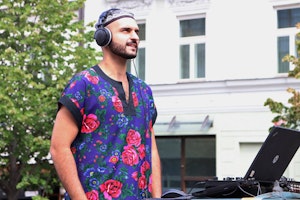Homophobia in Romanian Football Receives a Red Card from European Union Court
By Mariana Berbec-Rostas
On April 25, the Court of Justice of the European Union (the Court) announced its ruling in the first discrimination case on grounds of sexual orientation from Romania. A Romanian LGBTI organization brought the case challenging George Becali’s homophobic statements, claiming they should be interpreted as the position of the Club as employer.
ACCEPT Association, Romania’s oldest LGBTI rights advocacy group, and the first Romanian human rights organization to plead before the Court, complained in 2010 to the Romanian equality body, National Council for Combatting Discrimination, about Becali’s public statements in February 2010 when he said that “not even if I had to close Steaua down would I accept a homosexual on the team. There’s no room for gays in my family, and Steaua is my family.” The statements referred to a planned transfer of a Bulgarian football player rumoured to be gay. Becali, one of Romania’s most controversialpoliticians, is a former Member of the European Parliament (MEP), currently a Member of Parliament in Romania, and is the de facto decision-maker of the football club.
The Court ruled that Becali’s statements should be taken as evidence that Steaua has a discriminatory employment policy. It also affirmed that a national mechanism for punishing discrimination should be “effective, proportionate and dissuasive” and criticized the Romanian equality body for using the six-month time limit to apply warnings and not administrative fines. You can read more about the legal ruling here.
This judgement comes at a time of on-going struggle for Romania regarding its position within the European Union (EU), especially when it comes to democratic values and respect for fundamental freedoms. The country’s EU membership was conditioned upon continuous monitoring through the Cooperation and Verification Mechanism, with benchmarks on justice reform. Romania’s fundamental rights record continues to lag behind that of the “old” EU member states. Structural discrimination and exclusion go back to the foundation of the Romanian state in 1866 and were exacerbated by Nicolae Ceausescu’s communist dictatorship, one of the darkest and harshest periods in Romania’s modern history. Similar to its neighbours Hungary and Bulgaria, tackling racism, including anti-Gypsyism, anti-Semitism, homophobia, and sexism have not constituted a clear policy priority in the past 23 years. The situation has worsened since the onset of the financial crisis, subsequent austerity measures and a volatile political environment. The dissatisfaction of Romanians with their government’s management of the crisis is being ably exploited by far-right groups and populist politicians.
Mr. Becali is not the only politician engaging in discriminatory, hate speech. Although he is the only one to have collected a half dozen penalties from the Council to Combat Discrimination for discriminatory statements against Hungarians, Roma, sexual minorities, women, and people with disabilities. There is a general perception in Romania that politicians have the right to discriminate, with sections of the Romanian political elite now leading when it comes to hate speech. Several leading members of different mainstream political groups openly oppose same-sex partnerships or regard homosexuality as an illness.
The country’s Roma population—the most numerous and excluded ethnic group—are also a focus of racist attacks. Since 2006, three former ministers for foreign affairs have made public, racist statements regarding Roma. One of them, Adrian Cioroianu, a professor of history, made televised statements in 2007 calling for Roma to be “forced into hard labor” and proposing shipping Roma to Egypt’s desert. As a result of this culture of racism and discrimination in political circles, right-wing groups have sprung into action. In early November 2012, a group of seven young men and women were physically assaulted in downtown Bucharest by a group of ten people, after attending an academic debate about the history of homosexuality. During the assault, the attackers claimed they were opposing the “organization of gay events.” Similarly, in February 2013, a cultural event organised as part of ACCEPT’s LGBT History Month was violently interrupted by a group of far-right militants who burst into the cinema and occupied it, taking pictures of the participants and verbally assaulting them for participating in a “gay event.” In both cases, law enforcement failed to protect the right of the LGBTI community to freely express their views.
Against this background, the Court’s judgment goes beyond access to employment in football. The judgement is about the right of everyone in Romania to be treated equally. Romanita Iordache, an antidiscrimination legal expert and advisor in the case, stated in an interview with the author: “Anti-discrimination legislation has no impact if the mechanisms for implementation are not effective and the remedies for victims are not adequate, proportionate and dissuasive. This was the crux of the case: the compliance of the Romanian antidiscrimination law with the EU law on equal treatment in employment and occupation.” Iustina Ionescu, ACCEPT’s attorney in the case, hopes the judgement will serve as a “signal for Romanian authorities to apply antidiscrimination law with the same weight, irrespective of the public profile of the employer.” Florin Buhuceanu, director of ACCEPT and one of the leading LGBTI activists in Central Europe, stressed that, “homophobia has no place in sports, has no place in employment, and has no place in a European state.”
The judgment also carries implications for Romania’s equality body, whose key role is to punish those who discriminate and to promote equal opportunities. The National Council to Combat Discrimination’s decisions on perpetrators with public profiles, such as Mr. Becali, highlight its reluctance to take a strong stance on punishing discrimination by political actors. A robust approach to hatred is even more important now that the Parliament is scheduled to vote on recently proposed amendments to the Romanian antidiscrimination act. Romanian NGOs that advocate non-discrimination, including ACCEPT, hope that these amendments, which at the moment include a significantly higher penalty threshold, will add the necessary teeth to protection against discrimination in Romania.
Mariana Berbec-Rostas is a senior program officer for Open Society–Europe and Central Asia.


